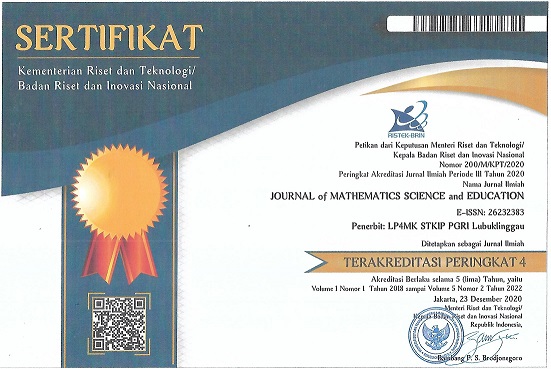OPTIMIZING THE ABILITY TO SOLVE MATHEMATICAL PROBLEMS THROUGH THE MEANS-ENDS ANALYSIS MODEL IN EIGHT GRADE
Abstract
This research aims to determine the mathematical problem solving abilities of eight grade students of Junior High School Number 2 Lubuklinggau after attending learning using the Means-Ends Analysis learning model in the good category. The population in this research were all eighth grade students of Junior High School Number 2 Lubuklinggau in the 2017/2018 academic year with research samples VIII.5. The design used in this study was a pretest-posttest control group design. Data collection techniques use a test of 5 questions which refers to indicators of mathematical problem solving abilities. Based on data analysis using the normality test and hypothesis testing data, it was found that obtained = 7.91 at the level of confidence α = 0.05 and = 1.671. So the results show that the problem solving abilities of eight grade students Junior High School Number 2 Lubuklinggau are in the good category with an average score of 7.24.
References
Efuansyah, & Wahyuni, R. (2017). Model Pembelajaran Missouri Mathematics Project (MMP) Menggunakan Strategi Think Talk Write (TTW) terhadap Kemampuan Pemecahan Masalah Matematika Siswa Kelas VIII. Seminar Nasional Matematika dan Pendidikan Matematika (hal. 60-64). Palembang: Universitas Sriwijaya.
Hadi, S., & Radiyatul. (2014). Metode Pemecahan Masalah menurut Polya untuk Mengembangkan Kemampuan Siswa dalam Pemecahan Masalah Matematis di Sekolah Menengah Pertama. EDU-MAT Jurnal Pendidikan matematika, 2(1), 53-61.
Juanda, M., Johar, R., & Ikhsan, M. (2014). Peningkatan kemampuan Pemecahan Masalah dan Komunikasi Matematis Siswa SMP Melalui Model Pembelajaran Means-Ends Analysis (MEA). Jurnal Kreano, 5(2), 105-113.
Lestari, K. E., & Yudhanegara, M. R. (2015). Penelitian Pendidikan Matematika. Bandung: Refika Aditama.
Pratiwi, d. (2016). Pengaruh Model Means-Ends Analysis terhadap Kemampuan Pemecahan Masalah Matematis Siswa Sekolah Dasar. Jurnal PGSD Kampus Cibiru, 4(3), 1-15.
Putri, P. M., Mukhni, & Irwan. (2012). Pemahaman Konsep Matematika pada Materi Turunan melalui Pembelajaran Teknik Probing. Jurnal Pendidikan Matematika, 1(1), 68-72.
Sahrudin, A. (2016). Implementasi Model Pembelajaran Means-Ends Analysis untuk Meningkatkan Kemampuan Pemecahan Masalah Matematika Mahasiswa. Jurnal Pendidikan Unsika, 4(1), 17-25.
Shoimin, A. (2016). 68 Model Pembelajaran Inovatif dalam Kurikulum 2013. Yogyakarta: Ar-Ruzz Media.
Susanto, A. (2013). Teori Belajar Pembelajaran di Sekolah Dasar. Jakarta: Kencana Prenada Media Group.
Wahyuni, R., & Efuansyah. (2018). Model Pembelajaran Missouri Mathematics Project (MMP) Menggunakan Strategi Think Talk Write (TTW) terhadap Kemampuan Berpikir Kritis dan Kemampuan Pemecahan Masalah. JNPM (Jurnal Nasional Pendidikan Matematika), 2(1), 24-36.
Yumiati. (2013). Penerapan Model pembelajaran Berbasis Masalah dalam Meningkatkan Kemampuan Pemecahan Masalah Matematis Siswa SMP N 9 Pamulang. Seminar Nasional Matematika dan Pendidikan Matematika (hal. 189-195). Bandung: STKIP Siliwangi.

This work by Journal of Mathematics Science and Education is licensed under a Creative Commons Attribution-NonCommercial-ShareAlike 4.0 International License.

















